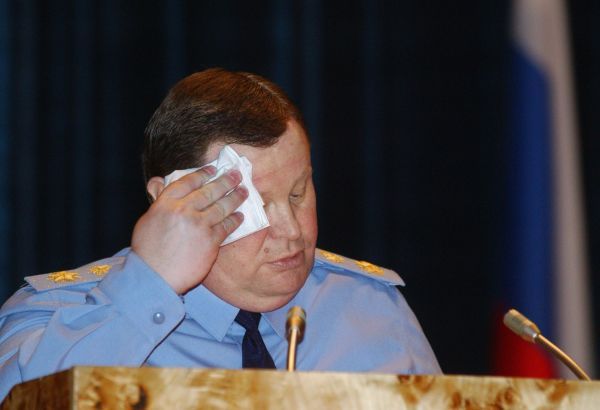
Vladimir Ustinov Named Presidential Envoy to the Southern Federal District
Publication: North Caucasus Weekly Volume: 9 Issue: 19

President Dmitry Medvedev has named Vladimir Ustinov, who previously held the post of Justice Minister, to be presidential envoy to the Southern Federal District, replacing Grigory Rapota, who has been switched to the post of presidential envoy to the Volga Federal District. Ustinov is widely viewed as a member of the hardline faction of Kremlin “siloviki” – his son Dmitry is married to Inga Sechina, a daughter of Igor Sechin, the reputed de facto “siloviki” chief who was appointed deputy prime minister in charge of industrial and energy policy in the latest round of appointments.
Ustinov is not without experience in southern Russia and the North Caucasus in particular. He was Sochi’s chief prosecutor from 1992 to 1994 and from 1994 to 1997 also held the post of first deputy prosecutor of Krasnodar Krai. From June 1998 until April 1999, he headed the Main Directorate for the North Caucasus of the Prosecutor General’s Office with the rank of Deputy Prosecutor General. In August 1999, then President Boris Yeltsin promoted Ustinov to the post of Prosecutor General.
As the analyst Vladimir Pribylovsky pointed out on his website, Antikompromat.ru, that same month – August 1999 – Ustinov “approved the actions of the leadership of Dagestan in handing over weaponry to the inhabitants of the republic,” following an incursion by Chechen-based rebels led by the field commander Shamil Basaev and Khattab. In November 2001, Ustinov participated as a prosecutor in the trial of Chechen rebel field commander Salman Raduev.
The late Yury Shchekochikhin reported in Novaya Gazeta in March 2003 that President Vladimir Putin had awarded Ustinov – along with then Federal Security Service (FSB) Director Nikolai Patrushev and Kremlin Security Council Secretary Vladimir Rushailo – the Hero of Russia medal for “successes in the Chechen war.”
In an address to the State Duma on October 29, 2004, Ustinov suggested a policy of “counter-hostage taking,” stating: “The detention of relatives of terrorists while a terrorist act is being carried will unquestionably help us preserve and save people.” As Pribylovsky wrote: “Since Ustinov did not specify that ‘counter-seizure’ applies only to adult relatives of participants in terrorist acts, since the proposal was made immediately after the tragedy in Beslan, when around a thousand children wound up being hostages of terrorists and nearly three hundred of them died, and also since the federal forces had earlier taken adult family members of militants as hostages, the prosecutor general’s proposal was in fact an innovation – the ‘counter-seizure’ of the CHILDREN of Chechen militants as hostages.” Pribylovsky also noted that in December 2004, Ramzan Kadyrov’s security service took eight relatives of rebel leader Asian Maskhadov hostage and that while the wife of one of those seized appealed to Ustinov in January 2005, seven of the eight remained hostages until May 2005, several months after Maskhadov was killed by security forces, while one of Maskhadov’s relatives was officially arrested for alleged membership in “illegal armed formations.”
Ustinov also presided over the official investigation of the explosions in residential buildings in Moscow and Volgodonsk in September 1999 that helped justify the second war in Chechnya. This investigation ignored accusations about the purported role of the security services in the bombings. In addition, Ustinov presided over the prosecution of Yukos founder Mikhail Khodorkovsky.
Ustinov tendered his resignation as Prosecutor General in June 2006 following a meeting with Putin, but within weeks was named Justice Minister. As the Moscow Times noted at the time, Russian media speculated that Ustinov was forced out as Prosecutor General because of allegations that his office had shielded officials accused of participating in a smuggling operation through the Moscow furniture retailers Tri Kita and Grand that involved millions of dollars in unpaid import duties. Soon after Ustinov’s departure, prosecutors arrested Sergei Zuyev, the head of Tri Kita and Grand, as well as four others, for alleged involvement in the smuggling ring (see Moscow Times, June 19, 2006).
The fate of two other officials who have been involved in North Caucasus policy – Aslambek Aslakhanov, who has been Putin’s adviser on the North Caucasus, and Gen.-Col. Gennady Troshev, the former commander of Russian forces in Chechnya who has been serving as presidential adviser for Cossack affairs – remains uncertain. On May 15, Gazeta quoted Aleksei Malashenko of the Moscow Carnegie Center as saying that the delay in an announcement about the bureaucratic fate of Aslakhanov and Troshev suggests that Chechnya policy will be “corrected” to some degree. “In general the course will remain unchanged and will be directed at supporting Kadyrov, despite the story with the Yamadaevs, however there will be some clarifications,” Malashenko told the newspaper. He added that such changes in policy could also result from the appointment of Aleksandr Bortnikov, who headed the economic security department of the Federal Security Service (FSB), to replace Nikolai Patrushev as FSB director. Patrushev, who has been appointed secretary of the Security Council, a presidential advisory body, also headed the National Anti-Terrorism Committee, which was involved in North Caucasus policy.
Dmitry Badovsky, deputy director of the Institute for Social Systems, told Gazeta that he believes the Kremlin will give increased attention to the situation in the North Caucasus and that he did not share the view of many observers that Ustinov’s appointment as presidential envoy to the Southern Federal District was simply a prelude to his retirement from government service. “This nomination is additional proof that the situation in the Southern Federal District is of principle importance to the federal center,” Badovsky said. “Ustinov will continue the rotation of regional leaders and strengthen the fight against crime. He will become the eye of the sovereign in the south.”
Vz.ru on May 15 quoted Chechen President Ramzan Kadyrov as saying that Ustinov’s appointment as presidential envoy to the Southern Federal District would have a positive effect on the region given that, in Kadyrov’s words, “this person knows the situation in the North Caucasus well.” Ingushetia’s president, Murat Zyazikov, said that Ustinov would stabilize the situation in the region and help solve socio-economic problems. “Vladimir Ustinov is a well-known person, an authoritative and pragmatic politician with much experience in managerial and leadership activity,” Zyazikov’s press service quoted him as saying. Zyazikov’s statement also cited Ustinov’s experience in the area of “realizing national projects,” adding that he will work effectively with region’s leaders.
RIA Novosti on May 15 quoted the vice speaker of the parliament of North Ossetia, Stanislav Kesaev, as saying that Ustinov’s appointment continues a policy oriented toward “a triumph of law in the region” and that “all of the actions that will be taken by the new team of the president will above all be kept in a strict legal position.” Kesaev said that the transfer of Grigory Rapota out of the position of presidential envoy to the Southern Federal District is evidence that the North Caucasus is no longer being looked at “through the prism of the special services.”




